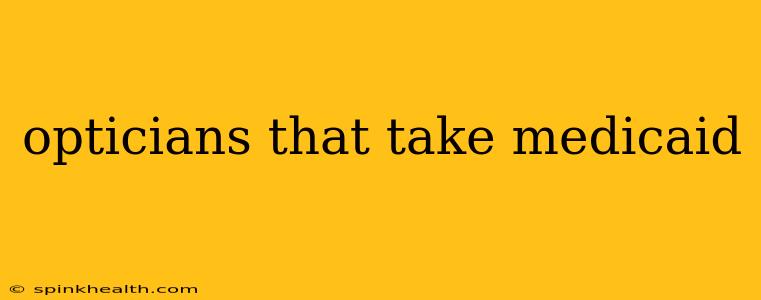The search for affordable eye care can feel like navigating a maze, especially when you rely on Medicaid. Finding an optician who accepts your insurance can be the key to unlocking access to essential vision services. This isn't just about glasses; it's about maintaining good eye health, which is crucial for overall well-being. Let's unravel the process together and explore how you can find opticians that take Medicaid in your area.
My journey started with a frustrating search. I needed new glasses, but the cost seemed insurmountable. The thought of putting off necessary eye care due to finances was daunting. Then, I discovered the world of Medicaid-accepting opticians, and the relief was immense. This quest led me to discover some crucial strategies for others facing similar challenges.
How to Find Opticians That Accept Medicaid
This isn't a one-size-fits-all solution, as the availability of Medicaid-accepting opticians varies depending on your location. However, a few reliable methods consistently provide results:
1. The Medicaid Website: Your state's Medicaid website is your first port of call. Most state Medicaid programs have online directories that list participating providers. Simply search for "Medicaid provider directory [your state]" on Google. This is the most reliable resource, as it provides a continuously updated list of approved providers.
2. Online Search Engines: Use targeted keywords when searching online. Instead of just "opticians," try "opticians that accept Medicaid near me," or "Medicaid eye care providers [your city/zip code]". Remember to always verify the information found online by checking with the provider directly or your state's Medicaid website.
3. Your Doctor's Referral: Your primary care physician or ophthalmologist may be able to provide referrals to opticians who accept Medicaid. They might have a list of preferred providers or know of practices in your area known for working with Medicaid patients.
Frequently Asked Questions (FAQ)
Finding answers to common questions makes the process smoother. Here are some frequently asked questions about finding Medicaid-accepting opticians:
What services are covered by Medicaid for eye care?
Medicaid coverage for eye care varies depending on your state and specific plan. Generally, it covers essential services like eye exams, necessary glasses (including frames and lenses), and sometimes even contact lenses. However, the specific coverage details are outlined in your Medicaid plan's benefit summary, which is usually available online or from your state's Medicaid office. Always review your plan benefits to understand your coverage limits.
Are there any limitations on the types of glasses or frames covered?
Yes, there often are. Medicaid plans typically have limitations on the cost of frames and lenses. You might not be able to choose the most expensive options. Additionally, some plans may have specific requirements for the types of lenses covered (e.g., only basic lenses are covered, while progressive lenses may require additional payment). Understanding these limitations ahead of time will prevent disappointment. Check your plan's benefit guide for specific details.
Can I choose any optician, or do I need to choose from a specific network?
This depends on your Medicaid plan. Some plans operate on a managed care model, meaning you must choose from a network of providers. Others offer more flexibility. Always check your plan information to understand whether you're restricted to a network or can choose any participating provider.
What if I can't find an optician in my area that accepts Medicaid?
If you struggle to find a Medicaid-accepting optician near you, contact your state's Medicaid office. They might be able to provide you with a list of providers or guide you through the process of appealing a decision to deny care. They can also offer assistance in finding alternative solutions within the limits of the program.
What documents do I need to bring to my appointment?
Bring your Medicaid card and any other identification you're asked for. It's best to confirm with the optician's office beforehand what documentation is required to ensure a smooth check-in process.
Finding affordable eye care shouldn’t be a struggle. By utilizing these strategies and understanding your Medicaid coverage, you can access the eye care you need and deserve. Remember, your vision is vital, and taking the steps to maintain it is an investment in your overall health and well-being.

